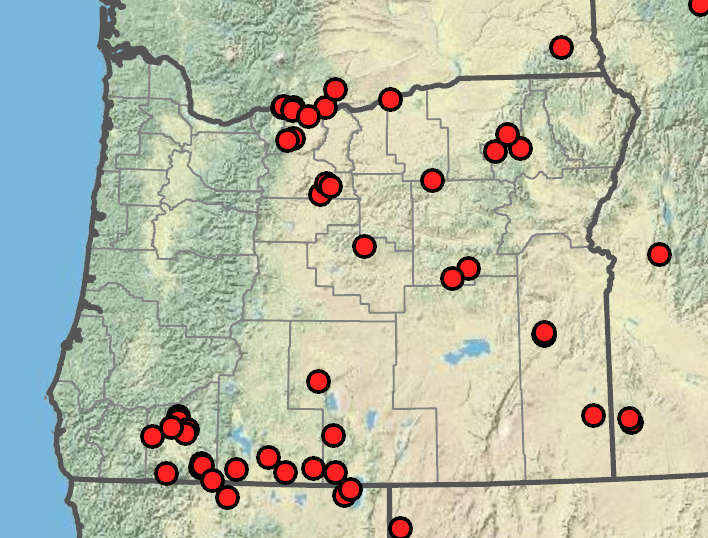Juncus trilocularis
Juncus howellii
foothill rush
Howell's rush
thin and wiry;
blade flat and slightly inrolled;
auricles soft and thin distally, 0.3–3 mm; dull, rounded or acute; dirty white.
flat; grass-like, blue-green; up to 4.5 mm wide;
auricles absent or 0.2– 2 mm.
cymes, 2–20 cm, usually open;
bractlets subtending flowers acute to acuminate, often aristate.
(2)5–20 clusters; clusters usually 2–8-flowered.
tepals 6, 3.3–5.1 mm; greenish to pale brown, nearly concolorous;
tips acuminate;
outer tepals distinctly longer than inner tepals;
stamens 6;
filaments 0.5–0.8 mm;
anthers (0.6)0.8–1.7 mm;
styles 0.3–1 mm.
tepals 6, dark brown, papillose; inner usually longer than the outer;
stamens 6;
filaments 0.6–1.1 mm;
anthers 1.2–2.6 mm;
styles 1.2–3.2 mm.
2.8–4.1 mm; shorter than the tepals, pale brown to dark brown;
apex truncate to notched (acute), crested, 3-chambered.
obovoid; shorter than the tepals, brown; acute, 3-chambered.
0.4–0.6 × 0.2–0.3 mm, apiculate, reticulate.
slender, 0.6–1 × 0.25– 0.3 mm;
body 0.4–0.6 mm; tail 0.1–0.3 mm, 1 or 2 tails at least half the length of the seed body.
Juncus trilocularis
Juncus howellii
Seasonally damp meadows, springs, shores, creek banks, moist open forest, ditches. 300–1900m. BW, Col, ECas, Owy, Sisk, Casc. CA, ID, NV, WA. Native.
This is an uncommon species found east of the Cascade Range and in the Siskiyou Mountains that has long been confused with Juncus brachyphyllus, a plant of grasslands and glades in the Midwest, which occurs no further west than Nebraska.
Springs, gravel bars, wet slopes, peatlands. 600–2200m. BW, Casc. CA, ID, WA. Native.
Auricle characters are occasionally unreliable, so this species is best separated from J. orthophyllus and J. regelii by the intermediate length of the tail on the seed, with one or both seed tails about half as long as the seed body. Juncus orthophyllus has apiculate seeds without a tail, and J. regelii has seed tails approximately as long as the seed body.
Peter Zika
Peter Zika
- Local floras:
CA,
OR,
WA
- Local Web sites:
CalFlora,
CalPhotos,
Flora NW,
PNW Herbaria
WildflowerSearch
iNaturalist (observations)
USDA Plants Database
- LBJ Wildflower Center
- SEINet
- Plants of the World Online
- Encyclopedia of Life
- Wikipedia
- Google Image Search
- Local floras:
CA,
OR,
WA
- Local Web sites:
CalFlora,
CalPhotos,
Flora NW,
PNW Herbaria
WildflowerSearch
iNaturalist (observations)
USDA Plants Database
- LBJ Wildflower Center
- SEINet
- Plants of the World Online
- Encyclopedia of Life
- Wikipedia
- Google Image Search

